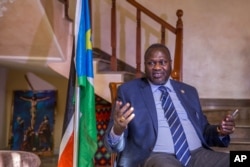It appears there is another delay to the arrival in Juba of South Sudan rebel leader Riek Machar’s forces, a crucial part to the implementation of the agreement signed last August between the Juba government and the SPLM-In Opposition.
A week ago, rebel leader Machar told VOA he was ready to return to Juba once the city had been demilitarized and the first group of 1,370 of his forces had been transported to Juba.
Now SPLA-In Opposition military spokesman Colonel William Gatjiath Deng says the troops will not be arriving in Juba Tuesday as scheduled because the South Sudan government has not designated cantonment areas and food and medical care facilities for the troops.
“They supposed to go tomorrow to Juba, but we have a number reasons that can prevent our troops to go to Juba. These numbers can be numerated, like the government of South Sudan will designate cantonment areas within Juba, and also they can even provide transportation from Juba. When our troops reach the airport in Juba, they can also be picked up from the airport to our cantonment areas. And also we agreed that they can even provide basic life support like water, food, and medical care,” he said.
Col. Deng also said the Joint Monitoring and Evaluation Commission (JMEC) has yet to get guarantees from the Ethiopian government to allow the rebels passage through Ethiopia with their light weapons.“Also, the JMEC agreed that they have to talk with the Ethiopian government so that they can approve the transit of our weapons from Gambella, including our ammunition and light weapons because our troops cannot just go without approval from the Ethiopian government,” Deng said.
He said the IGAD-Plus, which includes the East African Community, the African Union, China, the European Union, Norway, the UK, United States, and UN are supposed to transport the rebel troops to Juba. But once the troops arrive in Juba, the South Sudan government would be responsible for transporting the troops to the cantonment areas.
Government blames rebels
But the South Sudan government said the rebels are to blame the fact that their troops will not be arriving in Juba on Tuesday as part of the peace agreement. Information Minister Michael Makuei said the rebels have yet to submit the names of their troops to the troika that is supposed to transport them to Juba as well as the types of weapons they are bringing.
“The main issue is not the absence of food or non-preparation of the site for their accommodation, but the main problem is on the side of the SPLM-IO which failed to give the list of these soldiers to the troika and to the EU who are supposed to transport them to Juba,” Makuei said.
Makuei said government forces have begun moving out of Juba, but they slowed down because they don’t want to leave Juba without security.
Deng appealed to South Sudanese to have patience. He said the rebels are simply following what the agreement said.
“We need to go back to our country and our capital. We know that our people really need peace. And of course, we also need peace. But if these things are not being done, how could we just go [to Juba] without guaranteeing this,” Deng said.









